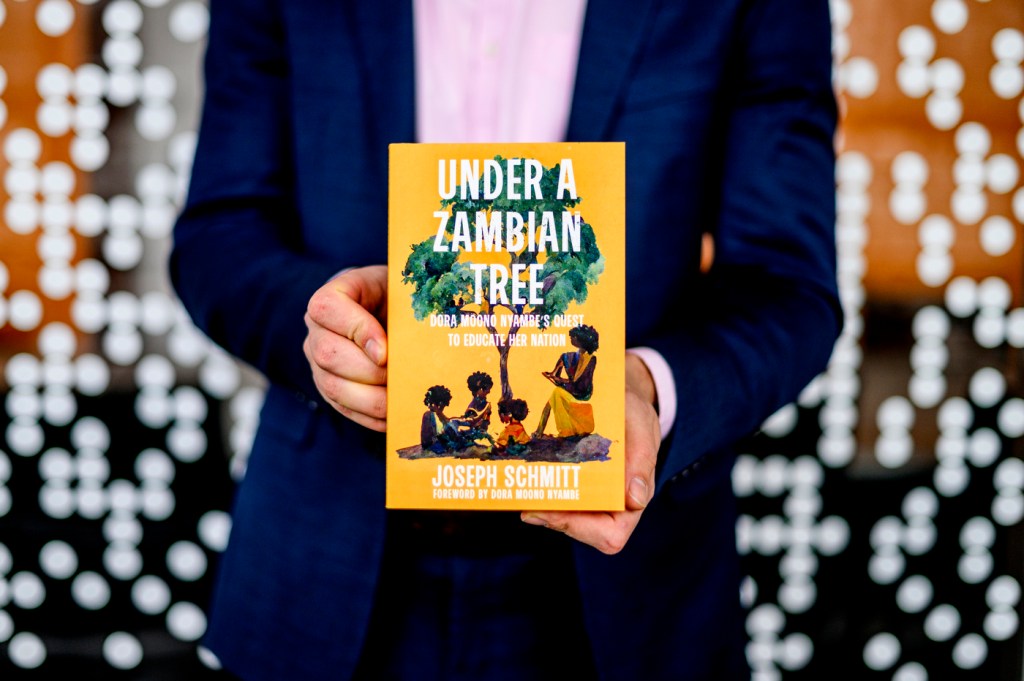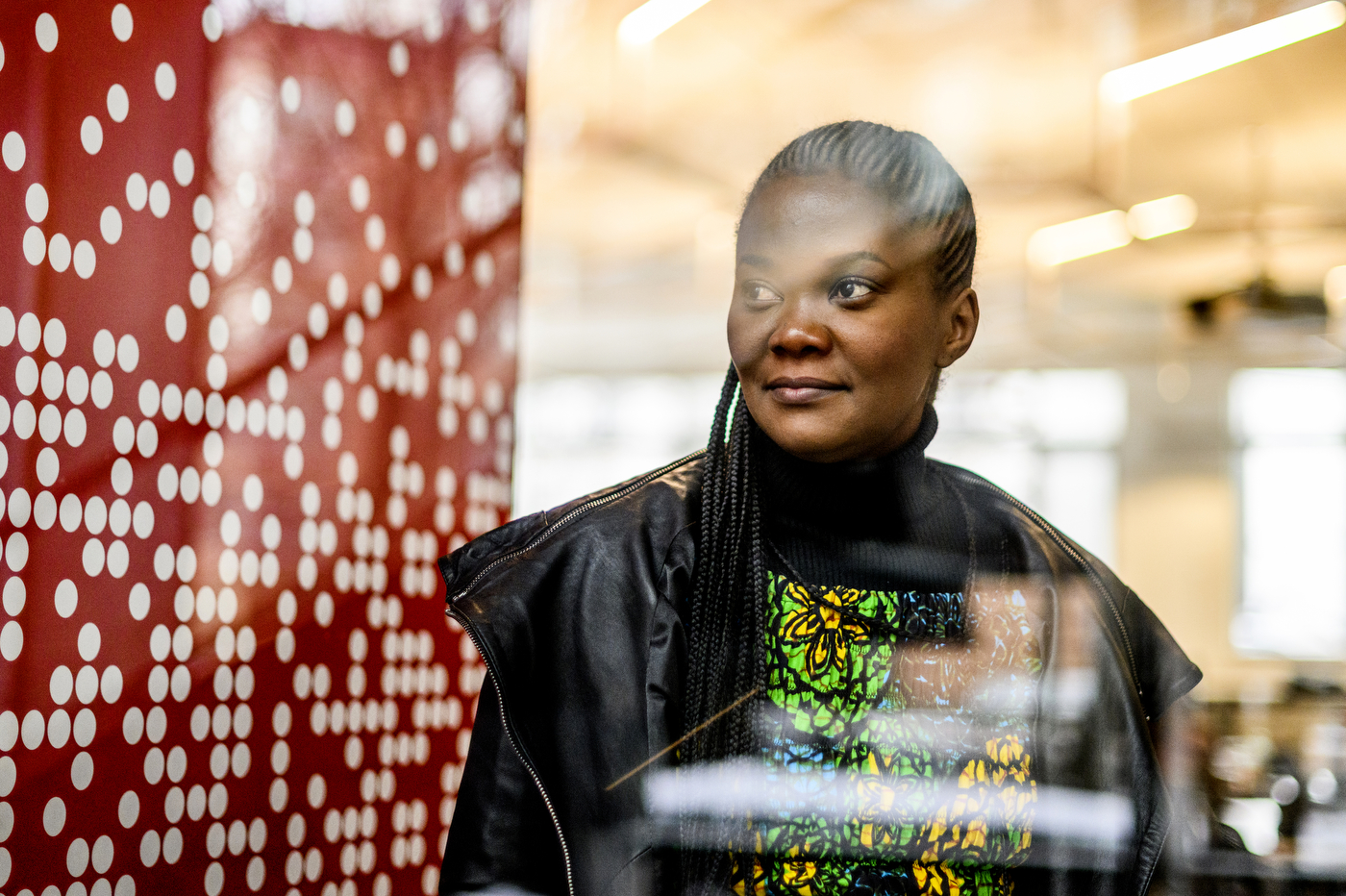‘I’m trying to amplify her voice.’ Northeastern graduate writes book about a young Zambian woman who is fighting poverty with education, hope and social media

When Northeastern University graduate Joseph Schmitt visited a village school for impoverished children in Zambia while on a Fulbright scholarship, he expected to spend a pleasant day with teachers and students before resuming his study of ecotourism in the landlocked African country.
Instead, Schmitt ended up spending a year shadowing the school’s founder, a young adoptive mother named Dora Moono Nyambe, and writing a book chronicling her experiences, called “Under a Zambian Tree.”
“I’m trying to amplify her voice, but I couldn’t fathom accomplishing or even trying to accomplish what she’s done,” Schmitt says. “She’s incredible.”
Nyambe, now 30, overcame nearly incredible odds to establish the school and development organization, called Footprints of Hope.
Thanks to the power of social media, she has 4 million followers and a network of donors who come from everyday walks of life.

But none of that was in sight when Nyambe first visited the village of Mapapa to see a friend in 2019.
A teacher and adoptive mother of five, including three teenagers, Nyambe was distressed by the poverty, malnutrition and lack of educational opportunity she witnessed in the small village, where many girls were forced into early marriage because their families could not afford to support them.
“By the second or third day, I was asking, ‘Why aren’t these kids in school?’” Nyambe told Northeastern Global News during a recent book tour in Boston.
She decided to move to the village and open a school under the shade of a tall mpundu tree next to a mud hut where she lived with her two younger adopted children.
If Nyambe, who grew up in the Zambian capital of Lusaka, had been looking for harbingers of failure, they weren’t hard to find.
The mud hut was destroyed by termites.
Villagers who didn’t understand her mission circled threateningly at night.
Six months worth of savings from Nyambe’s job as a school teacher in a more urban area were fast running out.
Then one of her daughters introduced her to TikTok, which prompted her to post a video about her educational and charitable organization, Footprints of Hope.
In a steady series of posts the photogenic Nyambe makes witty and poignant arguments against child marriage, shows children playing, studying and napping at the school, and demonstrates how to use a cloth to carry a baby, in this case her 13th adopted child, a 2-month-old girl.
The TikTok posts have attracted 4 million followers, generated a GoFundMe campaign and led an explosion of opportunity for children in and around Mapapa.
Footprints of Hope has gone from five students and no schoolhouse to a campus of 350 students—including 150 boarders—with dormitories, classroom buildings, a library and dining hall that serves three meals a day.

Most of the donations have come from TikTok viewers who give whatever small amounts they can afford, which makes the funding of Footprints of Hope unique, Schmitt says.
“Lots of TikTok users are young. I think they relate to me, also as a woman who is Black,” Nyambe says.
Nyambe makes it clear in her social media posts that she pursues criminal prosecution against abusers.
But she says instead of showing sad-eyed children—the image used by many charities—she shows hope and the good that comes with proper nutrition, education, care and love.
“Yes, there are kids that are suffering. But that’s not all they are. They are also amazing human beings,” Nyambe says.
“They make this amazing art. They love sports. They love to read. I show these other aspects that you wouldn’t typically see in a traditional African story of the poor child wanting help,” she says.
For Schmitt, who graduated from Northeastern in December of 2019, part of what makes Nyambe’s development organization so unique is that it does not rely on corporate donations or government funding.
The Zambian government does run schools, but not the type Nyambe models, with three meals a day and aid to students’ families, including a blind parent abandoned by her husband who was barely surviving until Nyambe built her a house.
Schmitt says he traveled to Zambia on a Fulbright scholarship to study the impact of ecotourism after leaving a management consulting position.
“I’m really passionate about conservation,” Schmitt says. In addition to writing the book about Nyambe and Footprints of Hope, he completed an economic impact assessment about ecotourism in Zambia and is hoping to get it published.
After the book tour, which will take him up and down the East Coast and to his native Wisconsin, Schmitt hopes to work for an ecotourism expedition company in Africa, one that benefits local people and economies.
Nyambe says Schmitt’s book has brought Footprints of Hope “to life in an amazing way.”
“He has shown aspects of it that I can’t really show on social media. It’s very hard to put it all in 60 seconds,” she says.
Footprints of Hope, which currently employs 15 teachers as well as additional staff, has a goal of adding a grade every year through grade 12, after which it will help students plan for college, Nyambe says. Currently the school goes up to grade seven.
Establishing the school “has been a learning curve” for the villagers and for her, Nyambe says.
Local people are becoming increasingly invested in the organization, she says.
“Instead of having starving kids that look like skin and bones, we have healthy, plump kids. People think, ‘Okay, this is actually a good thing. Our kids are benefiting more than we thought,’” Nyambe says.
“Dora is really an incredible lesson on how everyone has their own Zambian tree,” Schmitt says.
“It may not be starting a school or adopting a child, but it might be helping someone in a different way.”
Cynthia McCormick Hibbert is a Northeastern Global News reporter. Email her at c.hibbert@northeastern.edu or contact her on Twitter @HibbertCynthia






